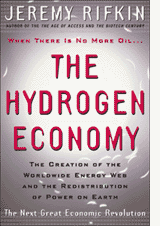
One way or another oil is on its way out. Either we will start to run out in the next couple of decades — and Jeremy Rifkin begins his book with a compelling case that it will be sooner rather than later — or the prospect of global warming will force us to find other fuels. As this comprehensive volume makes clear, the post-carbon world really has only one option to rely on: hydrogen fuel cells. These generators are more than twice as efficient as combustion engines and produce only water and heat as by-products. And unlike other forms of clean energy, they can be made to power anything from a Chrysler to the Chrysler Building.
Hydrogen is ubiquitous in nature, but it’s usually bound up with other elements (as in H2O). At present it is cheaper to strip it from natural gas, but if hydrogen is to sustainably replace fossil fuels, Rifkin writes, we’ll need to split it from water instead, using wind or solar power. And he’s insistent that we need to plan now for these renewables — before our other fuel supplies start to dwindle.
Rifkin also explains in workable detail how a hydrogen economy could be far more decentralized and democratic than our current energy system. An optimistic futurist, he envisions urban and rural cooperatives combining the output of locally owned fuel cells in a “hydrogen energy web,” which would let people trade electrons the way Napster let them pass around Moby tracks. As you might guess, it’s a vision that the Exxons of the world will do their best to oppose — and since at the moment they control our government, Rifkin’s book is really a call to political arms. And not a moment too soon.














